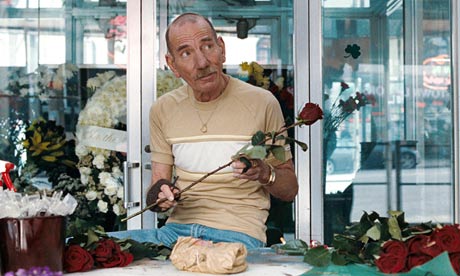
The hell-for-leather pace of this memoir by the maverick actor Pete Postlethwaite is explained by the fact that death was knocking fairly insistently at the door as he put it together. When, finally, the film star's luminous energy began to wane last year, he invited the writer Andy Richardson to help him finish the project. This means that many of the earlier chapters – those dealing with Postlethwaite's youthful adventures and his career in subsidised theatre – have the speed and sketchy detail of anecdotes remembered in the pub. Undoubtedly, this was a man who spent a lot of time in pubs. But after reading this book, you come away with a sense that, given more time, Postlethwaite would have chosen a more completist approach to his own story.
Certainly, his attitude to acting was always perfectionist, if not obsessive. At one point, he recalls working on Brecht's The Good Person of Szechwan with co-star Bill Paterson, who is shocked to see the number of squiggles, queries and underlinings covering Postlethwaite's script. In contrast, Paterson's copy was marked with a couple of margin notes.
Time and again, the Warrington-raised star of Distant Voices, Still Lives, In the Name of the Father, The Usual Suspects and Brassed Off emphasises his passion for getting his acting right. Even faced with his final film role, when cancer had limited his capabilities, Postlethwaite recounts his fiery rejection of a director's suggestion that the shooting of a scene be altered so he could sit in a chair. There was no point for him, he said, if he was not improving a film.
Such total commitment made playing the violent father in Terence Davies's masterpiece Distant Voices, Still Lives taxing. It upset him to have to identify with the character. "If you don't connect with the character, then you are on the road to superficiality and audiences always sniff out a phoney," he told himself. It was this vocational devotion that eventually earned Postlethwaite the rather burdensome label of, in Steven Spielberg's words, "best actor in the world". The Hollywood director was happy to use him whenever he could, apparently offering him the lead part in Saving Private Ryan before Tom Hanks came in as second best. And it was on the set of the Spielberg franchise The Lost World: Jurassic Park that Postlethwaite records modestly checking himself and marvelling at his rise to fame with the words: "It is a long way from Warrington."
The son of a caretaker, Postlethwaite trained at the Bristol Old Vic and then became one of a stellar group of talents, including Bill Nighy, Jonathan Pryce, Alison Steadman and Postlethwaite's then-girlfriend Julie Walters, who all learned their craft at the Everyman Theatre in Liverpool in the 1970s.
The camaraderie experienced there clearly remained important throughout his career. Reunited with Steadman for the West End production of The Rise and Fall of Little Voice, Postlethwaite writes of his pleasure at working with her again and of the steady arm he literally offered her each night on stage. Fearful of a blackout stipulated in the lighting cues, Steadman coped by reaching out for Postlethwaite's arm to guide her up the stairs at the back of the set.
Yet the comradeship of the Everyman was not enough to prevent a nervous breakdown induced by stress and illegal drug use during his period with the company's Van Load touring troupe. Paranoia struck the young Postlethwaite during a production of Arnold Ridley's trusty theatrical vehicle, The Ghost Train, which was put on to please the masses on a visit to Wales. Unhappy with the direction, Postlethwaite became convinced everyone was talking about him and suddenly walked off stage and disappeared for several days. The company was also working on a production of the disturbing play One Flew Over the Cuckoo's Nest , which didn't help.
Restored to sanity, although by his own admission still for a long time a "bohemian, beatnik, oddball, kaftan-wearing, reefer-smoking whacko", Postlethwaite gradually moved away from the stage to film. "I realised that film had an extraordinary ability to transmit purity of thought. If you're thinking nothing but the thoughts that are in the character's mind, then that is what the people in the cinema see," he writes. Endearingly, though, he sums up the appeal of his own acting as the contradiction between his face ("like a fucking stone archway") and his performance: "How can somebody who looks like a rugby prop forward actually be sensitive?" he imagines his audience asking.

